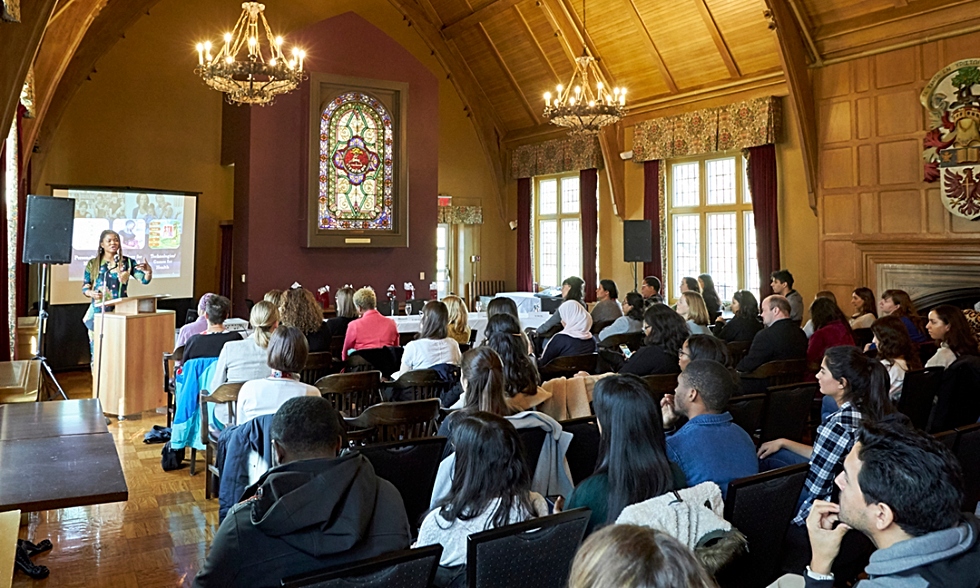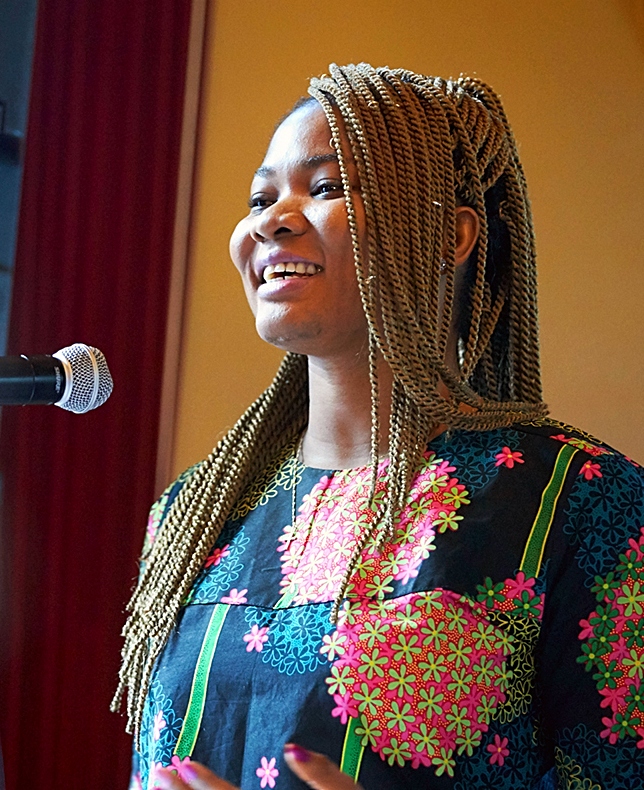Women in STEM: “We need to stop fixing women and start fixing workplaces”

At a recent symposium hosted by McMaster University Library, computer scientist and gender equality trailblazer Rita Orji of Dalhousie University and other experts, shared their thoughts on how to better support women in STEM fields.
“Equality is not about men, it’s also not about women; it’s about providing a nurturing environment where people of diverse traits can maximize their potential.”
That was the message from Rita Orji, an assistant professor of computer science at Dalhousie University, a trailblazer in advocating for gender equality in her field, and the keynote speaker at a recent symposium aimed at celebrating and supporting women in science, technology, engineering and math (STEM).

The symposium, hosted by McMaster University Library in partnership with Women in Science and Engineering (WISE) at McMaster and the Health Sciences Library, brought together experts from across the postsecondary sector, as well as McMaster alumni, faculty and students to share their experiences and discuss ways to address this critical issue.
“Over the past few decades, great progress has been made in encouraging and supporting women who wish to pursue careers in STEM, but despite these advances, significant barriers still exist,” says McMaster University Librarian Vivian Lewis, who gave opening remarks at the event. “We hope today’s discussion can help advance this important conversation, both here at McMaster and beyond.”
In addition to Orji’s talk, the symposium included a panel discussion moderated by Kim Dej, McMaster’s associate vice-provost, faculty, which featured five women working in the areas of STEM and gender equity who offered insights on a range of topics from how faculty members can support female students in STEM fields, to how women and people of diverse backgrounds experience barriers to success in STEM.

In her talk, Orji, who is originally from east Nigeria and is the first woman from her community to earn a PhD, spoke about her personal journey, her efforts to combat the gender imbalance in STEM and her commitment to encouraging more women—and women of colour – to seek careers in STEM fields.
Orji shares her experiences and insights in the following excerpts from her keynote lecture:
On why she advocates for gender equity in STEM
I come from a gender-balanced family. Inclusion and diversity are a default in my family and that helped me to be self-confident as a human being. As a result, I became very sensitive to gender discrimination in the wider society and l learned to speak up.
I participated in student politics for as long as I can remember. I championed many campaigns against gender inequality. I am still actively involved in these issues.
On questioning her career choice
After I completed my PhD, it was time to look for my dream job. I started looking around for a black female professor to talk to because I wanted to see what the job was like. I immediately found that not many computer science departments had hired a female, black computer scientist.
It made me wonder if my decision to be a prof was a crazy idea and I wondered if this was really the job for me several times. This had nothing to do with me questioning my abilities – I already knew I was capable. I was determined to surmount every mountain to succeed. After all, I was a top student in all my studies.
I was scared because I couldn’t see my type and I didn’t know if the system would be able to accommodate my type and if I would be happy – if I would have to change who I am, or pretend to be who I am not, to be able to fit in. So, it was not about my ability or determination at all.
On overcoming moments of doubt
One of my supervisors always tells me and I quote, “Rita, if you don’t believe in yourself, no one else will,” so your first job is to believe in yourself and your capability. The next thing is to look for cheerleaders, people who will celebrate your success and pick you up when you fall. The next thing is to be proactive rather than reactive and learn to speak up. There’s nothing wrong with nominating yourself for anything you think you deserve or with declaring your interest. Don’t be afraid to raise up your hand and say. “Yes I can.”
On what’s important to her in a work environment
Getting a job is important, but it is more important to get a job that offers room and supports to grow. I was more inclined to sacrifice a higher paying job for a job that offered me opportunity and support for growth because, for me, that was important
On the need to negotiate
You need to ask for what you’re worth based on the market value. A friend of mine recently got an offer, I asked her did she negotiate, her answer was, “Hell no. I was just grateful that I got a job finally. I think the pay is ok.” But just with a little research, we found that she’s earning $20,000 less than an average salary in her position.
Bear in mind that they are not doing you a favour offering you that job or hiring you. In fact, they’re lucky to have you with your amazing skills that you bring to the table. With that in mind, negotiate your package with great heart.
On the importance of failure
For me, there’s no shame in failure. Our society tends to expect women to be perfect, that limits the capability to explore life. Our failures are often magnified, and we are scared to fail because its seen as a shameful thing. It’s not! Your ideas are as valuable as anyone else’s irrespective of your gender.
So, do not be afraid to voice your opinion – that may be what society needs to advance to the next stage. You need to validate yourself first before anyone else can validate you: learn to count on your wins to remind you how awesome you are.
On how organizations can support women’s success
We need to stop fixing women and start fixing workplaces. We can’t address the barriers that are holding women back if we don’t acknowledge them in the first place. So, the first step is for organizations to acknowledge that there are barriers and then think about how we can actually remove them.
We need to tackle institutional and systemic biases against women and minorities. For example, in many organizations, the criteria for promoting, hiring, evaluating and assessing innovations are unfortunately still biased and not designed to accommodate women. The system needs to be restructured to attract and promote diversity at various levels. I am happy that Dal computer science faculties are championing this.
By opening up the design of the system to accommodate women and other diversities, we’re not in any way undermining or devaluing the contributions of other groups. It will rather increase productivity and make the world a better place.
On her key messages to women aspiring to careers in STEM
You don’t need to be a superhuman to be successful in a STEM career. You do not need to be exceptionally talented to be successful in a STEM career. You do need an opportunity to prove yourself and you need a supportive environment. Lastly, you need to overcome the fear – you need to overcome yourself first and face the challenge.
Finally, I would like to encourage women to get involved in organizational or institutional politics and decision making where we can affect major policy decisions. I am pushing as many women as I can to take up positions in their organizations where they can effect change that would have a larger impact at the institutional level far beyond their lab and departmental settings. It’s not about you, but about those who follow you and need better women-friendly policies.
Final thoughts
Always remember that innovation knows no gender and no race. Intelligence knows no gender or race. Productively knows no gender or race. Opportunity is everything. That some of us got the opportunity does not necessarily mean we are quicker than others. Let’s work together to create systems that will provide women and girls with the opportunities to succeed – to be, and exist, as people so we can all live and achieve our full potential.
This symposium is part of a special year of programming developed by McMaster University Library in collaboration with the Health Sciences Library and the Faculty of Science, which is aimed at celebrating the ways in which the Libraries support research, teaching and learning related to Science, Technology, Engineering and Math (STEM).


